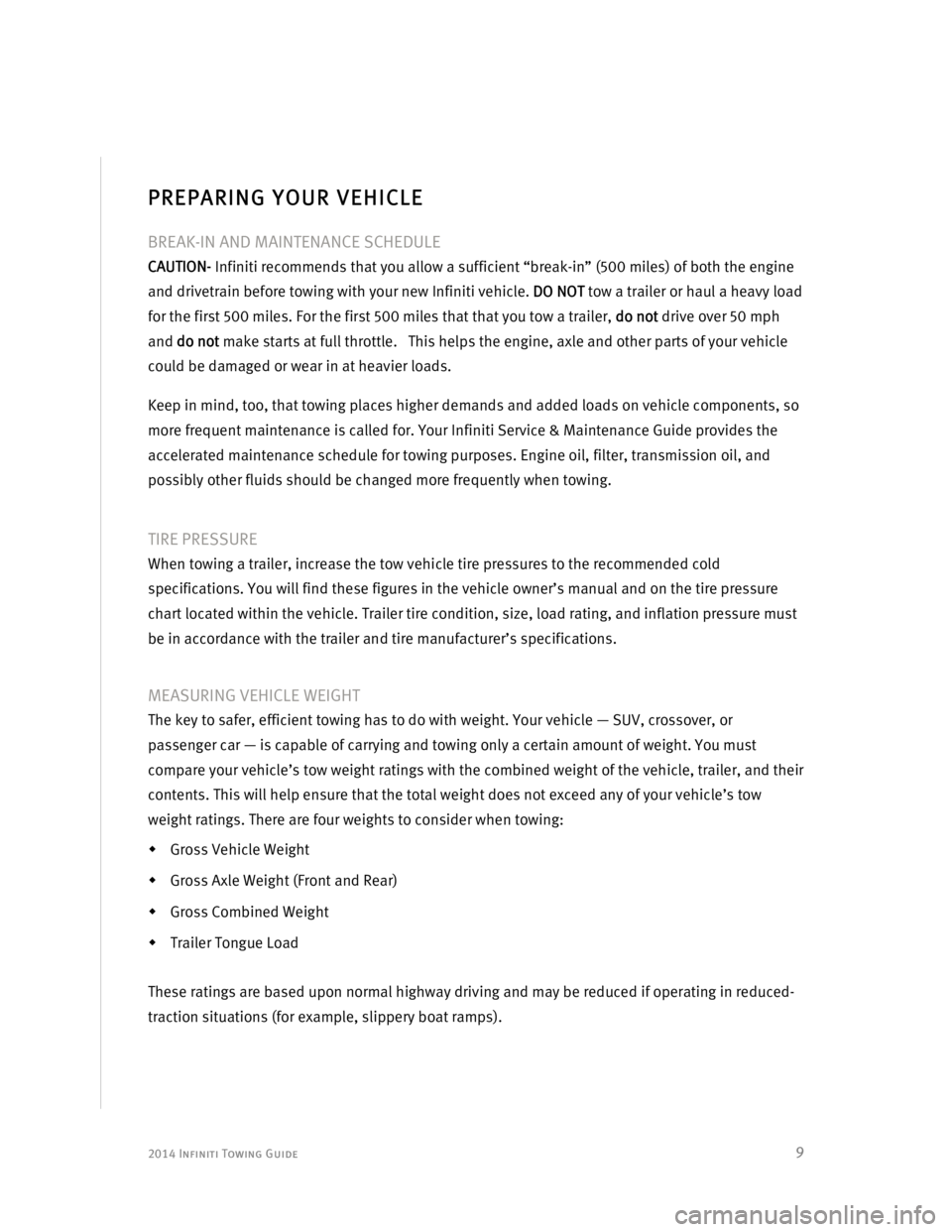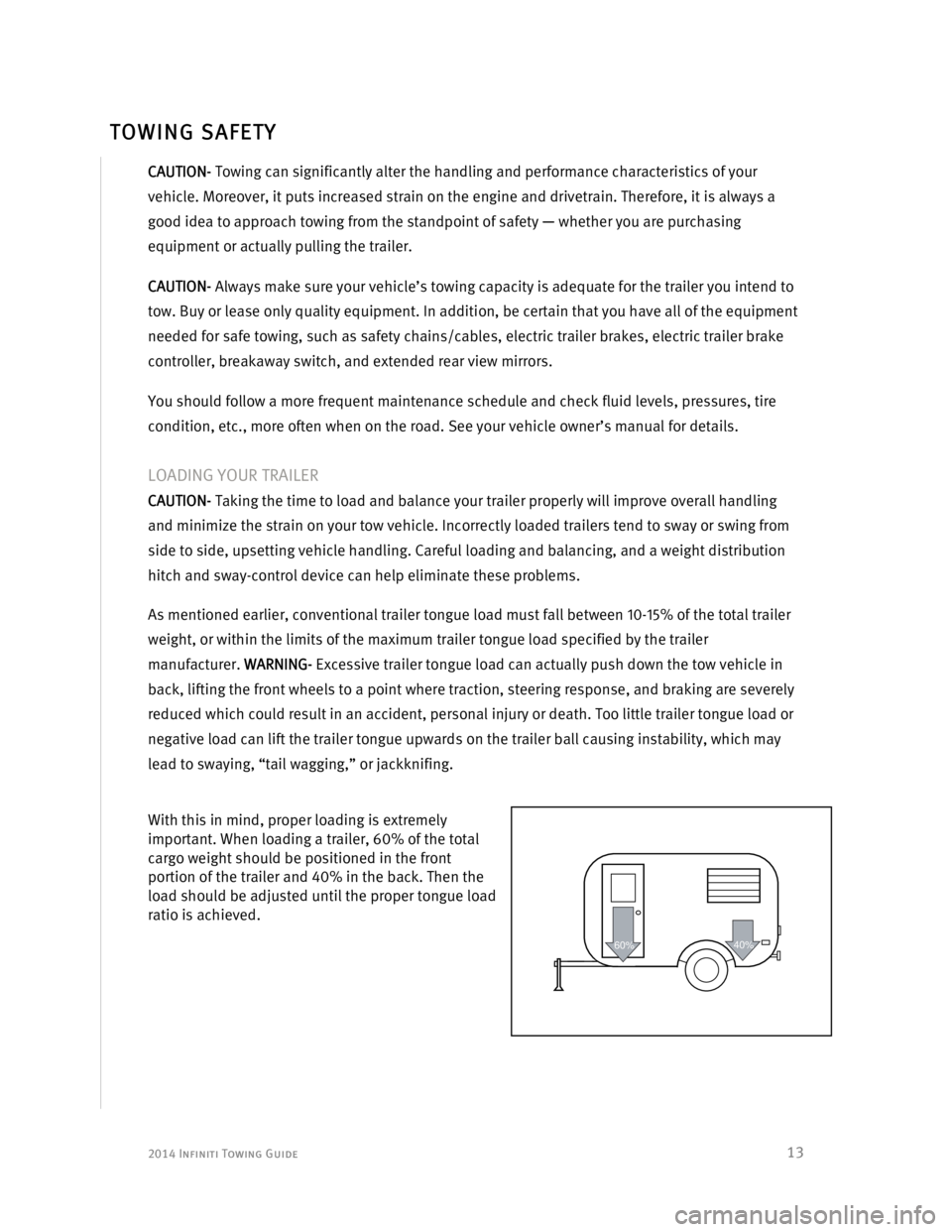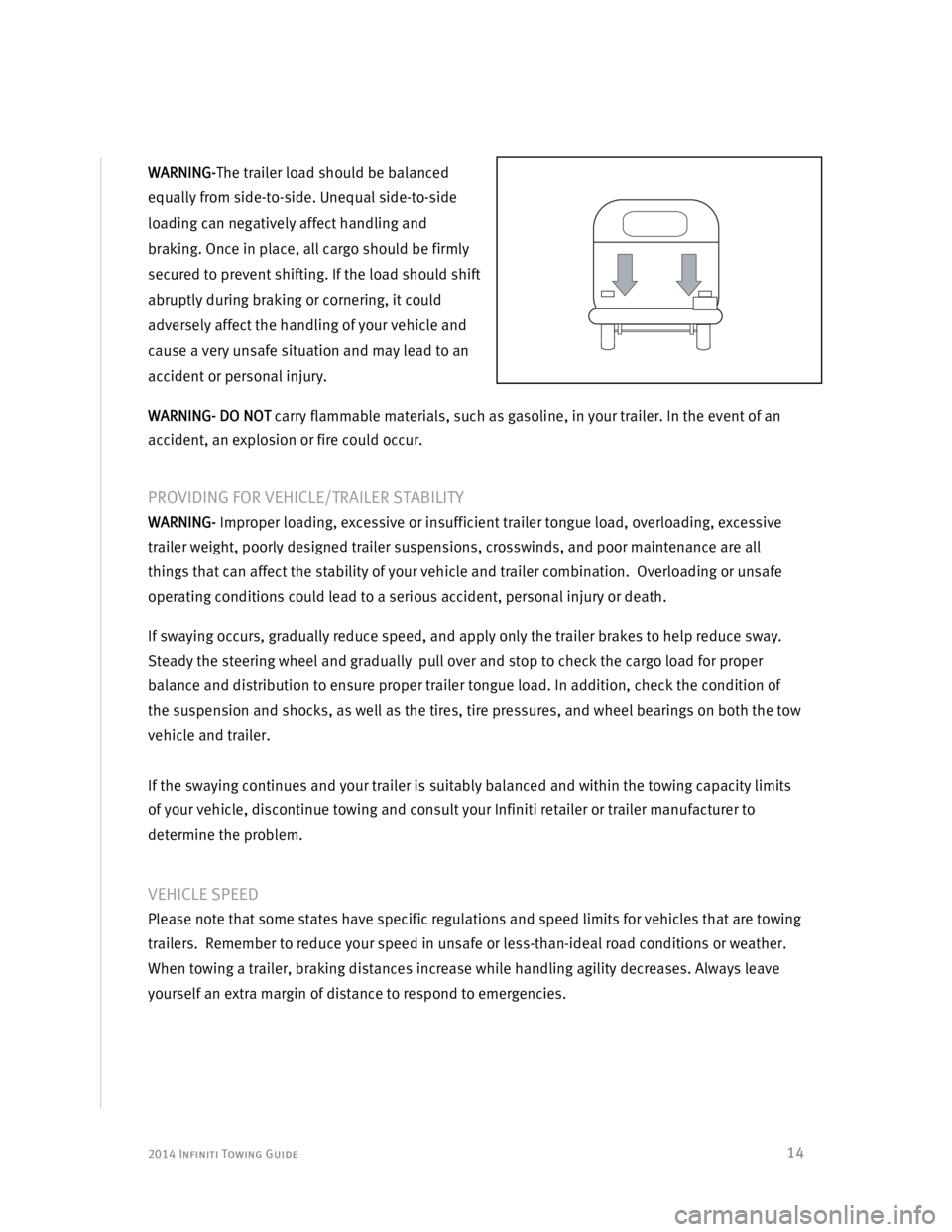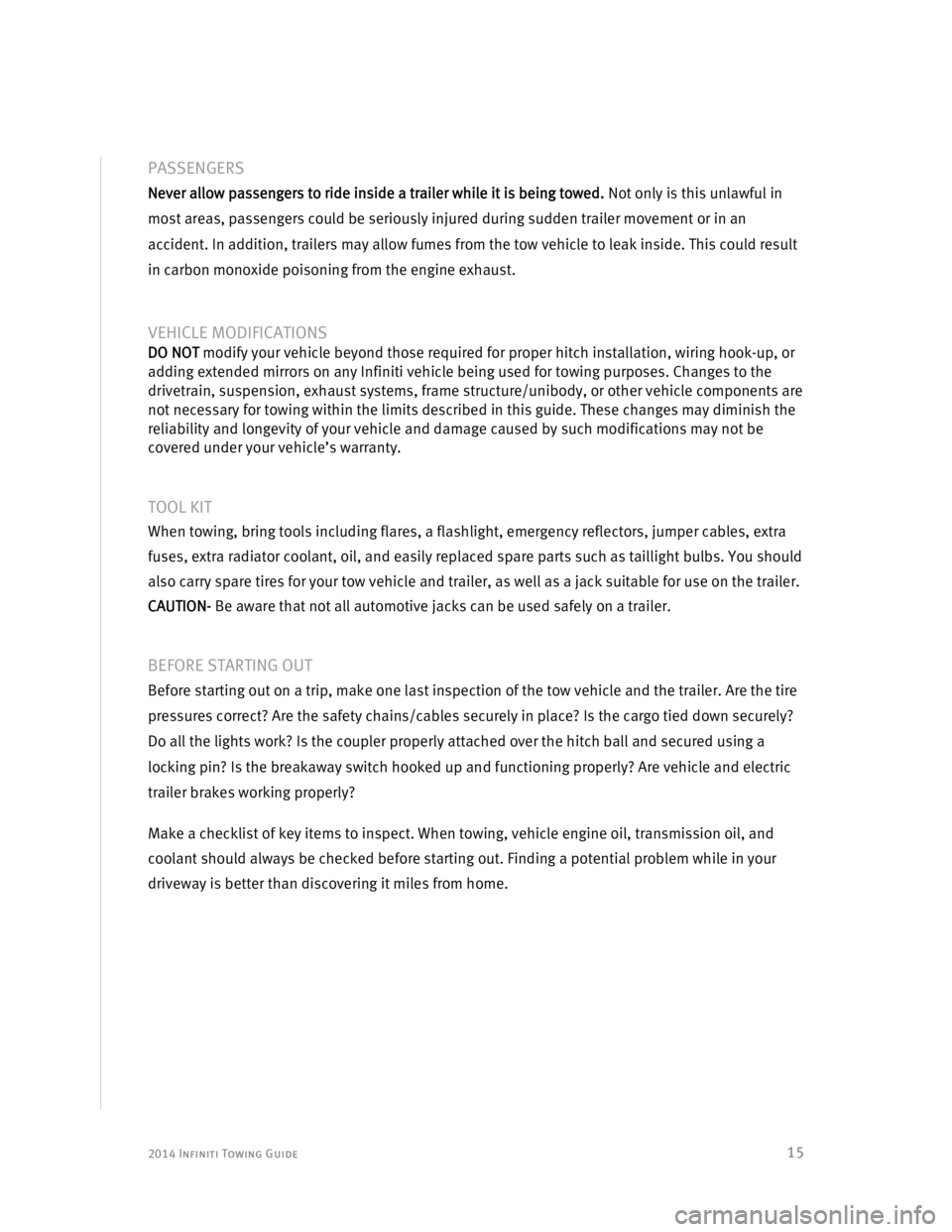tire pressure INFINITI QX60 2014 Towing Guide
[x] Cancel search | Manufacturer: INFINITI, Model Year: 2014, Model line: QX60, Model: INFINITI QX60 2014Pages: 25, PDF Size: 0.88 MB
Page 10 of 25

2014 Infiniti Towing Guide
9
PREPARING YOUR VEHICLE
BREAK-IN AND MAINTENANCE SCHEDULE
CAUTION- Infiniti recommends that you allow a sufficient “break-in” (500 miles) of both the engine
and drivetrain before towing with your new Infiniti vehicle. DO NOT tow a trailer or haul a heavy load
for the first 500 miles. For the first 500 miles that that you tow a trailer, do not drive over 50 mph
and do not make starts at full throttle. This helps the engine, axle and other parts of your vehicle
could be damaged or wear in at heavier loads.
Keep in mind, too, that towing places higher demands and added loads on vehicle components, so
more frequent maintenance is called for. Your Infiniti Service & Maintenance Guide provides the
accelerated maintenance schedule for towing purposes. Engine oil, filter, transmission oil, and
possibly other fluids should be changed more frequently when towing.
TIRE PRESSURE
When towing a trailer, increase the tow vehicle tire pressures to the recommended cold
specifications. You will find these figures in the vehicle owner’s manual and on the tire pressure
chart located within the vehicle. Trailer tire condition, size, load rating, and inflation pressure must
be in accordance with the trailer and tire manufacturer’s specifications.
MEASURING VEHICLE WEIGHT
The key to safer, efficient towing has to do with weight. Your vehicle — SUV, crossover, or
passenger car — is capable of carrying and towing only a certain amount of weight. You must
compare your vehicle’s tow weight ratings with the combined weight of the vehicle, trailer, and their
contents. This will help ensure that the total weight does not exceed any of your vehicle’s tow
weight ratings. There are four weights to consider when towing:
�Š Gross Vehicle Weight
�Š Gross Axle Weight (Front and Rear)
�Š Gross Combined Weight
�Š Trailer Tongue Load
These ratings are based upon normal highway driving and may be reduced if operating in reduced-
traction situations (for example, slippery boat ramps).
Page 14 of 25

2014 Infiniti Towing Guide
13
CAUTION- Towing can significantly alter the handling and performance characteristics of your
vehicle. Moreover, it puts increased strain on the engine and drivetrain. Therefore, it is always a
good idea to approach towing from the standpoint of safety — whether you are purchasing
equipment or actually pulling the trailer.
CAUTION- Always make sure your vehicle’s towing capacity is adequate for the trailer you intend to
tow. Buy or lease only quality equipment. In addition, be certain that you have all of the equipment
needed for safe towing, such as safety chains/cables, electric trailer brakes, electric trailer brake
controller, breakaway switch, and extended rear view mirrors.
You should follow a more frequent maintenance schedule and check fluid levels, pressures, tire
condition, etc., more often when on the road. See your vehicle owner’s manual for details.
LOADING YOUR TRAILER
CAUTION- Taking the time to load and balance your trailer properly will improve overall handling
and minimize the strain on your tow vehicle. Incorrectly loaded trailers tend to sway or swing from
side to side, upsetting vehicle handling. Careful loading and balancing, and a weight distribution
hitch and sway-control device can help eliminate these problems.
As mentioned earlier, conventional trailer tongue load must fall between 10-15% of the total trailer
weight, or within the limits of the maximum trailer tongue load specified by the trailer
manufacturer. WARNING- Excessive trailer tongue load can actually push down the tow vehicle in
back, lifting the front wheels to a point where traction, steering response, and braking are severely
reduced which could result in an accident, personal injury or death. Too little trailer tongue load or
negative load can lift the trailer tongue upwards on the trailer ball causing instability, which may
lead to swaying, “tail wagging,” or jackknifing.
With this in mind, proper loading is extremely
important. When loading a trailer, 60% of the total
cargo weight should be positioned in the front
portion of the trailer and 40% in the back. Then the
load should be adjusted until the proper tongue load
ratio is achieved.
60%40%
TOWING SAFETY
Page 15 of 25

2014 Infiniti Towing Guide
14
WARNING-The trailer load should be balanced
equally from side-to-side. Unequal side-to-side
loading can negatively affect handling and
braking. Once in place, all cargo should be firmly
secured to prevent shifting. If the load should shift
abruptly during braking or cornering, it could
adversely affect the handling of your vehicle and
cause a very unsafe situation and may lead to an
accident or personal injury.
WARNING- DO NOT carry flammable materials, such as gasoline, in your trailer. In the event of an
accident, an explosion or fire could occur.
PROVIDING FOR VEHICLE/TRAILER STABILITY
WARNING- Improper loading, excessive or insufficient trailer tongue load, overloading, excessive
trailer weight, poorly designed trailer suspensions, crosswinds, and poor maintenance are all
things that can affect the stability of your vehicle and trailer combination. Overloading or unsafe
operating conditions could lead to a serious accident, personal injury or death.
If swaying occurs, gradually reduce speed, and apply only the trailer brakes to help reduce sway.
Steady the steering wheel and gradually pull over and stop to check the cargo load for proper
balance and distribution to ensure proper trailer tongue load. In addition, check the condition of
the suspension and shocks, as well as the tires, tire pressures, and wheel bearings on both the tow
vehicle and trailer.
If the swaying continues and your trailer is suitably balanced and within the towing capacity limits
of your vehicle, discontinue towing and consult your Infiniti retailer or trailer manufacturer to
determine the problem.
VEHICLE SPEED
Please note that some states have specific regulations and speed limits for vehicles that are towing
trailers. Remember to reduce your speed in unsafe or less-than-ideal road conditions or weather.
When towing a trailer, braking distances increase while handling agility decreases. Always leave
yourself an extra margin of distance to respond to emergencies.
Page 16 of 25

2014 Infiniti Towing Guide
15
PASSENGERS
Never allow passengers to ride inside a trailer while it is being towed. Not only is this unlawful in
most areas, passengers could be seriously injured during sudden trailer movement or in an
accident. In addition, trailers may allow fumes from the tow vehicle to leak inside. This could result
in carbon monoxide poisoning from the engine exhaust.
VEHICLE MODIFICATIONS
DO NOT modify your vehicle beyond those required for proper hitch installation, wiring hook-up, or
adding extended mirrors on any Infiniti vehicle being used for towing purposes. Changes to the
drivetrain, suspension, exhaust systems, frame structure/unibody, or other vehicle components are
not necessary for towing within the limits described in this guide. These changes may diminish the
reliability and longevity of your vehicle and damage caused by such modifications may not be
covered under your vehicle’s warranty.
TOOL KIT
When towing, bring tools including flares, a flashlight, emergency reflectors, jumper cables, extra
fuses, extra radiator coolant, oil, and easily replaced spare parts such as taillight bulbs. You should
also carry spare tires for your tow vehicle and trailer, as well as a jack suitable for use on the trailer.
CAUTION- Be aware that not all automotive jacks can be used safely on a trailer.
BEFORE STARTING OUT
Before starting out on a trip, make one last inspection of the tow vehicle and the trailer. Are the tire
pressures correct? Are the safety chains/cables securely in place? Is the cargo tied down securely?
Do all the lights work? Is the coupler properly attached over the hitch ball and secured using a
locking pin? Is the breakaway switch hooked up and functioning properly? Are vehicle and electric
trailer brakes working properly?
Make a checklist of key items to inspect. When towing, vehicle engine oil, transmission oil, and
coolant should always be checked before starting out. Finding a potential problem while in your
driveway is better than discovering it miles from home.